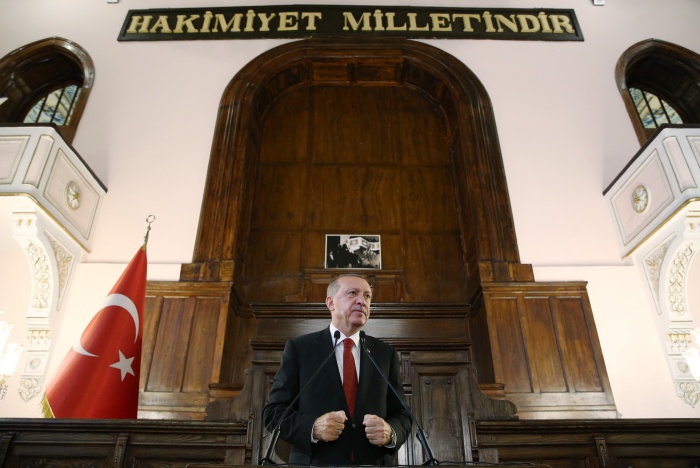[avatar user=”ABozkurt” size=”thumbnail” align=”left” link=”file” /]
Abdullah Bozkurt
The hastily arranged presidential decrees which completely re-designed the governance of Turkey from head to toe reveal that it will be a tremendous challenge, if not impossible, to bring the nation out of the terrible quagmire created by President Recep Tayyip Erdoğan in his pursuit of total control of all levers of power.
Hundreds of laws, some going back decades, have been rewritten in the rush to make changes in governance and move it away from a parliamentary democracy and towards the imperial presidency Erdoğan secured in an unfair and not-free referendum and elections. While Erdoğan by and large has subordinated all agencies to his office, many uncertainties and loopholes were created in the policy decision-making processes in the bureaucracy. It will take quite some time to digest these enormous changes in the laws, establish a new modus operandi and establish ways of doing things. They will also require hundreds pieces of secondary legislation to ensure that the changes can be applied in practice.
Law-decree No. 703, which was approved by the Cabinet on July 2, 2018 and published in the Official Gazette on July 9, included 233 articles and brought about thousands of changes in government agencies. The Erdoğan government not only circumvented the ordinary legislative process in the Turkish Parliament by resorting to a law-decree under a state of emergency but also did not bother to consult any stakeholders that will be affected by Law-decree No. 703. This is the peak of what we have been witnessing: a pattern of discarding an inclusive and evidence-based approach in the formulation of policy and legislation in Turkey under the watch of the Erdoğan regime. Even the financial assessment impact reports that are required for legislative changes have not been prepared by the government. The follow-up on monitoring of the implementation of legislative changes has not been done in most cases.
There is only one goal behind all these abrupt changes: Erdoğan’s big appetite for consumption of power, expanding his executive mandate all over the government, intimidating the opposition, suppressing even the slightest dissent and crushing criticism. He has centralized the powers of the ministries and other government agencies in his office and fired 150,000 professionals from the civil service in order to fill the void with partisans.
Turkey’s Islamist leader is now free to completely break away from traditional foreign policy and reorient it according to his regional and global ambitions. The abolishment of the Ministry of European Union Affairs, set up in 2011 by a special law to facilitate Turkey’s integration with the European Union during accession talks, has become official with Law-decree No. 703. The few leaders who turned up at his inauguration such as Venezuela’s Nicolás Maduro and Sudan’s Omer al-Basher show Erdoğan will pursue his anti-American and anti-Western discourse by cozying up to ideological bedfellows.
The civil service, already dealt a huge blow with massive purges, will not easily recover from the reorganization of the entire government structure that is now being gathered around Erdoğan’s palace. The functioning of the government risks coming to a grinding halt in the worst case scenario, or at least slowed down considerably under the best of circumstances, costing Turkey dearly in terms of productivity, efficiency and efficacy. Since Turkey’s corrupt judiciary is packed with Islamist and neo-nationalist hacks, there remains no arbiter to sort out differences among the competing interests of various agencies.
Given the fact that Erdoğan has mingled his Justice and Development Party (AKP) with the state, we now actually have two governments functioning in parallel to each other. This is most felt at the provincial level, where governors and government officials have to coordinate and/or clear their actions with AKP administrators in order to avoid inviting the party’s wrath. The conflict between the two that may be inevitable in some cases potentially carries the risk of paralyzing local governments as well. The same problem will also be felt abroad between embassy officials and NGOs that operate as Erdoğan’s long arm. Today, leaders of the Union of European Turkish Democrats (UETD), Erdoğan’s proxy group in Europe, exert more power than ambassadors.
In short, Erdoğan’s erratic behavior and his quest for absolute power have created a totally new and homegrown problem for Turkey that will continue to squander its precious energy, resources and human potential. It will be a major drag on the country amid the economic and financial difficulties Turkey is apparently experiencing with wrong policies and mismanagement.

